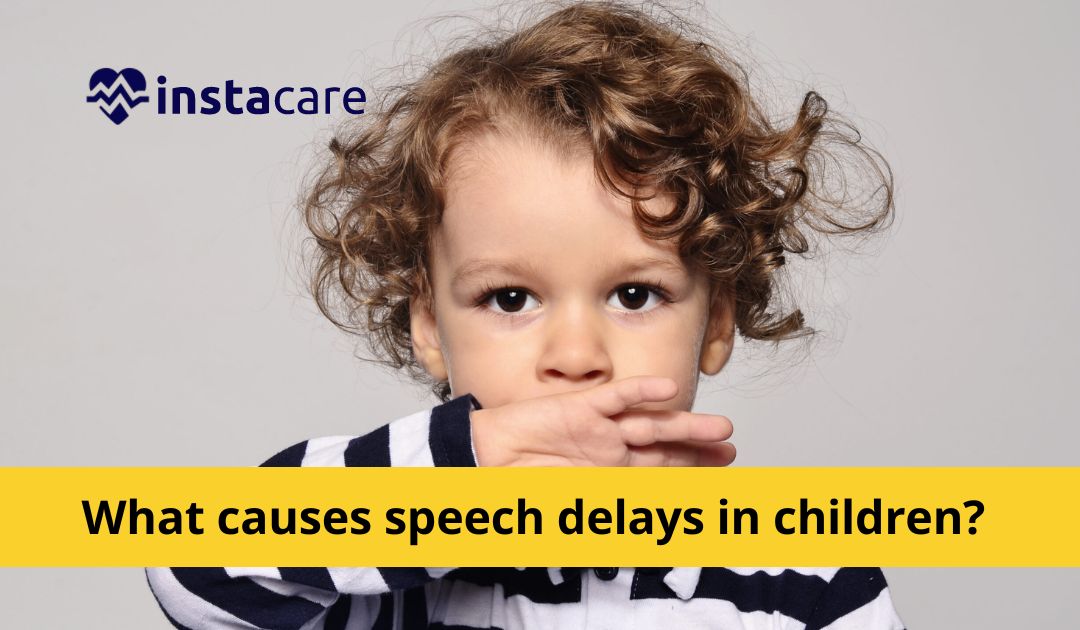It is normal for children to develop speech and language skills at their own pace, but if a child experiences prolonged irregularities or an unexpected delay in learning these communication abilities, it can be worrying for parents. Unfortunately, causes of speech delays in kids are not always immediately clear nor are treatments aimed at encouraging verbal progress necessarily simple tasks.
But understanding the various aspects that may lead to a delay as well as ways to assist your child’s development is important when it comes to helping them reach their full potential. In this article we will explore what constitutes a developmental speech disorder and look into some possible root causes of why a delay might happen.
Speech delays in children
Speech delays can have a major impact on many aspects of a child's life, from their ability to communicate with peers and adults to their academic success. Delays in the development of speech-language skills are common among children, but they don’t always mean impairment.
Children can likely overcome delays with the right support and intervention. Interventions could include individualized one-on-one therapy and activities at home such as having conversations about everyday tasks that encourage children to express themselves or repeating words to help them form connections between sounds and meanings. Understanding that some children are slower in developing these skills is key to early detection, though it’s important for parents to be aware of any possible speech abnormalities and contact a professional if necessary.
Normal speech development
It is important to understand the different stages of speech development that a child may go through in order to help them succeed. Normal speech development begins with infants cooing and babbling when they are around 4 months old. Then, at around 5-7 months, most babies will begin to use jargon - strings of sounds similar to an adult language. By the time children are 18-24 months, their vocabulary is greatly expanded - toddlers can say about 50 words and put two words together to form simple sentences.
As they continue to advance, most children will have mastered over 2000 words by the time they reach five years of age! Additionally, their pronunciation of sounds like "f" and "s" will become well-developed during this time period as well. With proper parenting and reinforcement from other supportive caregivers, normal speech development should continue until a child reaches 8-9 years old when generally greater understanding and usage of grammar becomes established.
Speech delay symptoms
Speech delays in children are a concern for parents and typically, the earlier a delay is identified and treated, the better the outcome. Symptoms of speech delays can vary depending on age, but some of the most common issues seen include limited use or understanding of words and phrases, difficulty repeating sound patterns or syllables, difficulty following directions, endless jabbering without recognizable words or phrases, trouble being understood by others, difficulty forming new words and sounds as well as articulation problems.
It is normal for children to go through some speech-related difficulties in early childhood; however if these issues persist beyond a certain age it may be beneficial to consult with a professional for assistance.
Causes of speech delay
1- Mental retardation
Mental retardation is a condition that causes some children to develop and learn more slowly than other children. This can lead to speech delays, impairments in communication, and difficulty understanding social cues. There are many causes of mental retardation, such as genetic problem during development, exposure to toxins before or during the birth process, or infections like meningitis.
Other causes may include nutritional deficiencies, oxygen deprivation at birth, head trauma due to accidents or medical complications during pregnancy. Speech delay caused from mental retardation can be diagnosed by a healthcare professional using a combination of physical assessments and cognitive tests. Early intervention treatments have been shown to be effective in improving a child’s communication abilities as well as their overall quality of life.
2- Hearing loss
Hearing loss is a common yet often underestimated cause of speech delays in children. It can be caused by certain conditions at birth, exposure to loud noises, or infection. In addition, hearing aids are available for those with slight to moderate hearing loss to help reduce any disruptions this may cause.
Parents should make sure their child receives regular hearing check-ups from an audiologist to monitor changes in their hearing and catch any losses early on in order to reduce the chances of subsequent speech delays. Early intervention is essential for successful long-term communication development in our children, making it imperative that we keep open discussions around hearing loss and the impact it can have on speech.
View More: When Can Babies Start Drinking Juice
3- Maturation delay (developmental language delay)
Maturation delay in children causes delays in meeting certain developmental milestones and refers to a speech disorder that causes a gap between a child’s language ability and his or her chronological age. Common causes of this kind of speech delay in children include hearing loss, physical impairments, as well as potential learning disabilities or problems with attention.
It is also common for the delay to be due to biological causes such as immaturity in developmental processes that produce the necessary language skills. As different causes can result from maturation delay, the correct treatment will depend on what the cause of the speech delay is. Identifying the cause early helps parents take proper steps to assist their child with language development.
4- Expressive language disorder (developmental expressive aphasia)
Expressive language disorder, or developmental expressive aphasia, is a language disorder that causes a delay in the development of speech in children. It causes difficulty with spoken and written communication. Children may struggle to form sentences correctly and express ideas accurately in both spoken and written forms.
The causes of this type of speech delay can vary, ranging from delayed neurological development to hearing loss or physical impairments of the larynx and vocal cords. Professional consultation is essential for proper diagnosis so that treatment can be tailored to the needs of the child. With early identification and intervention, children can make tremendous progress in their ability to communicate with language.
5- Bilingualism
Bilingualism has many benefits, but it also presents certain potential causes of speech delays in children. Studies have suggested that exposure to two languages can lead to demands on a child's language processing ability, while making it more difficult for a young brain to acquire language variables like syntax and morphology, which can result in delayed or impeded acquisition of age-appropriate communicative milestones in both first and second languages.
Bilingualism may also create confusion between languages if a parent is not consistent when speaking with the child, further slowing the rate of language development. Fortunately, most speech delays associated with bilingualism tend to resolve themselves over time as long as uniformity is established between the two languages.
6- Psychosocial deprivation
Psychosocial deprivation can causes serious delays in speech development among children. Speech delays can occur when basic needs such as food, love, and security are deficient or absent from a child's environment. Factors such as poverty, abandonment, abuse, or neglect can contribute to psychosocial deprivation leading to the lack of communication and social skills which are necessary for imporving language development.
When this occurs, it is essential that parents seek help from professionals who specialize in assisting with the acquisition of language skills in order to ensure their child has the best chance at reaching their full potential.
7- Autism
Autism is a neurological condition that is characterized by impaired social abilities, communication difficulties, and repetitive behaviors. Because of its complex causes, parents may notice signs of autism in their children at various stages of development, including causes of speech delays in young children. Autism affects 1 in 59 children worldwide, according to autism speaks.
Early diagnosis is key as interventions such as applied behavior analysis (aba therapy) and speech therapies have been proven to help those on the spectrum improve language skills. There is no one-size-fits-all approach when it comes to treating individuals with autism as each person's unique circumstances must be considered through a tailored treatment plan.
8- Elective mutism
Elective mutism causes a delay in speech for children and is an anxiety disorder that causes them to feel unable to speak in certain settings. It primarily affects children, and can be caused by environments where the child feels uncomfortable, such as third grade classrooms or doctor's offices. Symptoms of this disorder include difficulty speaking or complete silence when prompted.
Therapies can help progress language development, often through use of play therapy which helps build comfort with verbalizing feelings and there is also the possibility of medication if needed. The causes of speech delays in children are strongly linked to this diagnosis and require immediate attention. Early detection could help give those affected a better chance at curing their elective mutism completely.
View More: When Do Babies Roll Over
9- Receptive aphasia
Receptive aphasia, also known as wernicke's aphasia or fluent aphasia, is an acquired speech disorder caused by damage to the language processing abilities of the brain. This form of language impairment causes difficulty understanding spoken and written words, comprehending messages, talking in complete sentences, and expressing their thoughts in any meaningful way. It can be caused by diseases such as stroke, head trauma, infections and neurological degeneration as well as causes of speech delays in children.
Those with receptive aphasia may have difficulty understanding commands and instead appear to be just repeating what another person said without being able to process the meaning. Treatments include speech therapy which can aid in improving language functioning and writing skills.
10- Cerebral palsy
Cerebral palsy is a group of neurological conditions that causes physical disability in body movement, balance and posture. It is caused by damage to the developing brain, which can occur during pregnancy or childbirth or in early infancy. One of the most common causes of speech delays in children with cerebral palsy is difficulty using the muscles involved in producing language. This difficulties may be due to problems affecting muscle control due to the condition, hypotonia (low muscle tone) or being unable to coordinate the movements necessary for speech production.
Other causes may include disruption in hearing due to fluid accumulation in the inner ear and difficulties understanding words for transmission to the brain for language processing. Treatments such as physical therapy and/or occupational therapy are effective at helping improve these causes of speech delay.
Speech delay treatment
Speech delays in children can have a range of causes, from physical difficulties to delays in language development. Treatments for speech delays vary in approach but may involve assessment and diagnosis by a speech-language pathologist, customized individual or group therapy sessions, home practice activities designed to improve communication skills, and depending on the child's specific needs, additional therapies such as occupational or physical therapy.
Working with a specialist to create the right combination of treatments can help children overcome any potential roadblocks, resulting in improved communication skills.
If you want to consult with the best pediatrician in Pakistan, book an appointment through InstaCare or you can call helpline number 02137136090 for assistance to find the right professional for your concerns.
Source: https://instacare.pk/blog/what-causes-speech-delays-in-children











